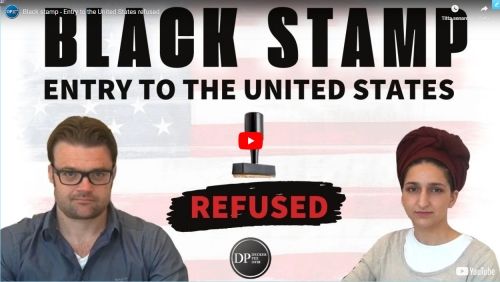US investment visas allow you to do all of the above – but it is very important to choose the right type of visa for your needs. A trade visa for an Israeli business trading or cooperating with a business in the United States is different from the visa required to start a modest business in the US, and this in turn is different from a Green Card for investors with significant sums of money.
In this article, a US immigration lawyer specializing in obtaining visas will explain the different investor visas in the United States – E1, E2, EB5 – the conditions, requirements, and what is important to know even before you start the visa application process.
What Do You Need to Know About These Visas in Advance?
First of all, the two most common investment visas – E1 and E2 – are both “non-immigrant visas.” This means that no matter how long you live in the United States while holding these visas, you will not be able to obtain permanent resident status (Green Card) based on your length of stay. If you do apply for a Green Card for any reason, your E visa is unlikely to be renewed. Furthermore, to obtain these visas, you must convince the US immigration authorities (USCIS) that you need the visa to oversee your investment in the US, rather than investing solely to obtain a US visa.
Obtaining or renewing each visa does not require you to stay in the US for a certain period, as long as the business remains active.
The investment must be in a for-profit business or company that provides services or products for payment. Non-profit organizations fall under different visa categories. Additionally, the investment must be in a business that requires active supervision by the investor/owner. For example, an investment in real estate, even if the property is rented to clients, will not qualify for an investment visa.
The investment amount cannot be based on a mortgage or loan secured by the business itself (i.e., the business’s operations are collateral for the loan repayment).
The business must be active and employ workers if you wish to renew the visa or obtain a Green Card based on the visa. Naturally, if the business goes bankrupt, your ability to live and work in the US will likely end as well.
Finally, every investment visa, even one that does not allow for obtaining a Green Card, allows to obtain accompanying visas for the married spouse and children (under 21 and unmarried) of the visa holder (the investor himself, and managers/key employees from Israel). Family members can live in the US, obtain a Social Security Number (SSN), and purchase health insurance. Spouses can even work in the US, wherever they please. Moreover, while the investor and key employees must work in the business they invested in, family members are free to work anywhere they wish within the United States.
Nevertheless, there are ways to obtain a Green Card even after arriving in the US with a non-immigrant investor visa or as an accompanying family member.
Children born in the US receive American citizenship based on their birthplace and can apply for a Green Card for their parents at the age of 21. Additionally, it is possible to obtain a Green Card through employment for a spouse or children or to obtain a Green Card based on a romantic relationship with an American citizen.
E1 Visa – Trader Visa
This visa type is for employees, managers, and business owners in companies that engage in “substantial” trade between Israel and the United States, wherein at least 50% of whose controlling shares are held by Israelis, to come to the US to oversee the business activity. Unlike other visas in this list, there is no need for a specific investment to obtain the visa – as long as the business is active and conducts substantial activity with the United States, it is possible to obtain a visa to develop and supervise the business activity. The trade does not have to be in physical goods – services, tourism, banking, technology development, and any other significant commercial activity will also qualify.
We should note the difference between the E1 visa and the L1 visa. The L1 intra-company transfer visa allows administrators and key employees to come to the US to oversee the activities of a branch, subsidiary, or affiliated company of an Israeli company. Unlike the E1 visa, there is no requirement for the US company to cooperate with Israel or have any direct commercial relationship with the Israeli company.
The visa is valid for up to 52 years and can be renewed as long as the business remains active and continues its activity with Israel.
E2 Visa – Investor Visa
This is a relatively new visa. After decades of negotiations, Israel and the US signed an agreement in 2019 that allows Israelis to obtain an investor visa in the US and US citizens to obtain an investor visa in Israel (B-5 visa).
To obtain the visa, a “significant” amount must be invested in establishing a business in the US or purchasing at least 50% of an active business. The exact amount considered “significant” is not precisely defined and depends heavily on the type of business, location, number of employees, and more. However, the business must contribute to the US economy and employ American workers, so we advise that the amount should generally be at least $100,000.
The investment can be in a small retail business – a store, a boutique, a restaurant – as long as this business employs several US workers and is expected to operate successfully.
It must be shown that the investment promoted economic activity in the business even before applying for the visa – as mentioned, you need to convince the authorities that you need a visa to manage the business, not that you are setting up a business solely to obtain a visa. It must be shown that the investment amount is active; the business has an office, work address, employees, inventory, a bank account, and tax identification numbers. It is also necessary to have a certificate from an American accountant confirming that the business exists and that the Israeli visa applicant is the owner of at least 50% of the business.
The main requirement for obtaining the visa is presenting a well-organized and detailed business plan, outlining how you will establish the business, sources of income, how the business will grow, develop, and expand in the future – income, losses, expenses, investments, opening branches, and hiring employees for the next five years. Additionally, it is important to prove that the business owner or the manager applying for the visa has experience and skills in managing and developing similar businesses in the past. In other words, before applying for the visa, it must be shown that you are not throwing money and the visa to the wind, and the business is at least sustainable, or better yet, expected to thrive.
Several Israelis can be employed as workers and managers in the business, but it must also employ at least the same number of American citizens.
The visa is valid for two years and can be renewed as long as the business remains active. Passport holders from a country with a longer-standing mutual investment agreement with the US may be eligible for an E-2 visa that would be valid for up to five years each time.
EB-5 Visa – Green Card for Investors
This type of visa requires the highest investment amount – starting from $900,000 invested in economically distressed areas or $1,800,000 in less risky areas. The exact amount varies based on inflation. The investment can contribute to the establishment or purchase of a new business that the investor will manage themselves, or be part of a joint investment project.
As long as the business is active and employs at least 10 American workers full-time, the visa holder and their spouse/children, if they receive accompanying visas, will be considered to be Green Card holders (permanent resident status) in the US. If two years pass and the business is still active and employs at least 10 workers, the investor and their family receive the Green Card officially.
Which US Investment Visa Is Right for You?
As you can see, each type of visa suits different circumstances – a company trading with Israel, an independent business in the US, a serious investment sum for quickly obtaining a Green Card. The right path for you depends heavily on the specific circumstances and type of business you want to operate.
However, in our experience, the E-2 visa is the visa that most Israeli investors want. True, it does not allow for immediate Green Card acquisition, but it does allow you to live and work in the US you’re your nuclear family as long as the business is active.
Consult an Expert US Immigration Lawyer
In addition to finding the right type of visa and organizing the application properly, an immigration lawyer to the United States can help you find the right way to draft an organized business plan, considering the realities on the ground and the criteria of the immigration authorities. In 2023, approximately 900 applications for E visas to the US were received from Israel, and about 10% of all applications were rejected despite the applicant having the required investment amount, usually due to errors in filling out the application or a business plan that was not detailed and realistic.













